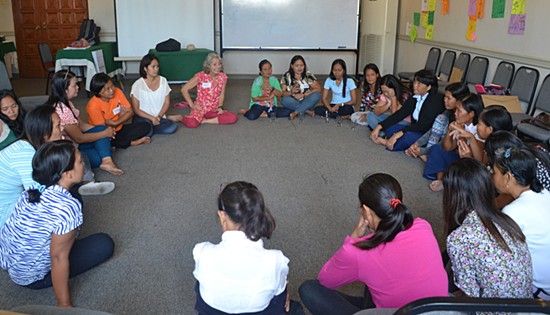|

HEALING
CLASSROOMS. In partnership with International Rescue Committee
(IRC), the Ramon Aboitiz Foundation Inc. Dolores Aboitiz
Children's Fund (RAFI-DACF) augmented its day care construction
project with IRC's "Healing Classrooms" program, wherein
teachers are trained to help children recover from crisis. |
IRC trains RAFI on
disaster, emergency response mgt.
By CELINE AMPARO,
RAFI Comm.
Intern
September 12, 2014
CEBU CITY – Aside
from donating to the relief and rehabilitation efforts of the Ramon
Aboitiz Foundation Inc. (RAFI), worldwide humanitarian organization
International Rescue Committee (IRC) has also started training RAFI in
terms of emergency and disaster response management.
The capacity building
training focuses on emergency competencies, economic recovery
programs, and team and stress management skills. Participants of the
training program include those directly involved in the Super Typhoon
Yolanda relief efforts.
Last February, IRC also gave
RAFI training on assessment and introductory module on emergency and
disaster response and resilience.
IRC, an organization formed
at the behest of scientist Albert Einstein, and RAFI held their
organizational development consultation last July 25 as part of the
program on capacity building and development of emergency and disaster
response procedures.
Evelyn Nacario-Castro,
Executive Director of the RAFI Eduardo Aboitiz Development Studies
Center, said IRC is very supportive of what RAFI wants to do.
“We see our partnership with
RAFI as a way to know how disaster response works in the Philippines,
in the same way we hope we can bring somebody around to be brave about
emergencies,” IRC Emergency Preparedness Coordinator Christine Amy
said.
IRC also partnered with the
RAFI-Dolores Aboitiz Children’s Fund (DACF) in the building of 20
disaster-resilient day care centers in the towns of Daanbantayan,
Bantayan, Madridejos, and Santa Fe, Cebu.
Of the 20 day care centers,
12 have been rehabilitated in Barangays Tinubdan, Dalingding, Pajo,
and Bitoon in Daanbantayan; Barangays Oboob, Baigad, and Okoy in
Bantayan; Barangays Poblacion, Kangyawan, and Kaongkod in Madridejos;
and Barangays Poblacion and Maricaban in Santa Fe.
The remaining eight are
newly-constructed day care centers in Barangays Bateria, Malbago,
Lanao, and Tapilon in Daanbantayan; Barangays Kampingganon and Sillon
in Bantayan; and Barangays Balidbid and Okoy in Santa Fe.
“The components of this day
care center (program) are the ‘Healing Classrooms’ where skilled day
care workers would work to identify trauma in children who experienced
difficult traumatic experiences due to a disaster and help them
develop their well-being,” IRC Emergency Field Director Suzanna Tkalec
said.
The Healing Classrooms
program is an original IRC concept designed to train day care workers
and teachers in using special techniques that would aid them in
engaging traumatized children from devastated areas, and create a
secure and nurturing learning environment for them.
IRC started the program in
2004, working with more than 5,000 teachers and 400,000 students each
year in countries like Afghanistan and Pakistan. IRC said families in
these devastated lands lost loved ones, homes, and jobs, and the
children often lacked the coping skills they need to move forward with
their lives.
"Since we want a holistic
recovery for the Yolanda survivors, we do not only train the day care
workers to help children cope, but we also teach them (day care
workers) to heal themselves because they were also devastated by the
typhoon," DACF Program Officer Jan Montilla said.
Together with IRC, DACF
trained 22 day care workers from 20 sitios and barangays in the four
towns.
IRC Consultant Trainer
Patricia Giffoni and DACF facilitated a training series for the day
care workers. The first training in July focused on methodologies and
techniques that can be used in teaching children inside the “healing
classrooms,” such as establishing routines on daily activities, and
cold calling during recitals or discussions.
The next training in August
focused on the assessment of children, wherein the day care workers
were trained how to craft participatory activities, such as games and
group works, appropriate for a child's age and stage of development.
Aside from ensuring the
children’s recovery, these activities are also aimed to develop the
seven domains of child development: gross and fine motor skills;
expressive, receptive and cognitive languages; and self-help and
spiritual development.